333 : Inside COP: China, India… and the Text on the Table
It’s the middle of week two at COP30, and the negotiations are entering their crunch phase - we ask whether the text on the page can match the momentum gathering pace in the real world.
About this episode
It’s the middle of week two at COP30, and the negotiations are entering their crunch phase. A draft cover text has finally landed, ministers are on the ground, and the presidency is pushing hard to close before Lula heads to the G20 in Johannesburg.
Paul Dickinson and Fiona McRaith look at the issues still holding up progress - from finance and adaptation to trade, the global stocktake, and the long-running debate over fossil fuel language. Plus, Germany’s former climate envoy Jennifer Morgan joins the show with a clear-eyed read of where things stand, what’s moving, what isn’t, and how the presidency is trying to break the deadlock.
But beyond the blue zone drama, real shifts are already reshaping the global transition. And nowhere is this more obvious (and more significant) than in the world’s two most populous countries:
On China, Professor Wang Yi , senior adviser to the Chinese government on climate change, outlines how rising energy demand is increasingly being met by renewables and new energy sources, why emissions may already have plateaued, and how the world’s largest solar exporter thinks about “steering” the clean economy without dramatic rhetoric.
And on India, Dr Arunabha Ghosh describes a “pentathlon” transition, sets out India’s avoided coal build-out, and explains why diversified supply chains will determine whether global deployment accelerates or stalls.
Whatever happens in Belém this week, the direction of travel from China, India and other rising economies will be impossible to ignore. But can the text on the page match the momentum gathering pace in the real world?
Learn more:
🔍 Read the COP30 Draft Cover Text
📖 Learn more about India's Local Grids to Global Power report, announced by Dr Arunabha Ghosh
🌍 Check out the official COP30 website for background and announcements
🎤 What do you want to hear on Inside COP? Ask us on SpeakPipe or on our socials where you can also see more behind the scenes moments and to watch our videos:
Instagram @outrageoptimism
LinkedIn @outrageoptimism
Or via this form.
Lead Producer: Ben Weaver-Hincks
Planning Producer: Caitlin Hanrahan
Edited by: Miles Martignoni
Exec Producer: Ellie Clifford
With thanks to Groundswell and Global Optimism.
This is a Persephonica production for Global Optimism and is part of the Acast Creator Network.
Full Transcript
Transcript generated by AI. While we aim for accuracy, errors may still occur. Please refer to the episode’s audio for the definitive version
Paul Dickinson: [00:00:04] Hello and welcome to Inside Cop from Outrage and Optimism. I'm Paul Dickinson.Fiona McRaith: [00:00:08] And I'm Fiona McRaith.
Paul Dickinson: [00:00:09] Today we discuss the latest from the negotiations. And we dig into the two biggest nations in the world, India and China. Thanks for being here. So how's your day?
Fiona McRaith: [00:00:28] It's good. How's yours? Paul?
Paul Dickinson: [00:00:29] Oh, well, actually, I lost my bag and all my recording equipment and completely freaked out and melted down and wound you up incredibly. But then the Uber system got me my bag back, and thank you very much. Nice taxi driver. And just one other thing. I met someone here and we were discussing where she was. She's an activist, an artist, and she challenged me and she sort of heard this incredible enthusiasm I've got for kind of industrialized this. And she said, is this making the world better? All this kind of like massive ramping up of production. And I said, No, you're completely right. I'm fascinated by industrializing. You know, solar and renewables and batteries to get fossil fuels out of the industrial system. And no, that's not actually making a better world. It's making a safer world from a climate change perspective. But I just I heard her a regular listener to this podcast, and I wanted to emphasize to our audience, I am not personally kind of into this idea that we solve a super production problem with more super production. I do think we've got so many issues to work out, and people from all over the world are here talking about all these different issues. So I just kind of I felt like I had my sort of karmic soul just gently prodded by somebody, and I thought I would share that experience. Have you had your karmic soul prodded?
Fiona McRaith: [00:01:44] I don't know, to the magnitude of that, at least not today.
Paul Dickinson: [00:01:49] Okay, so what have we got? There's a lot going on here, right? Let's dig in with the latest, so to say, under negotiations. And they are intensifying as ministers arrive and political decision making begins in week two. And there is the cover decision, which is a kind of text on the table now. And it's a significant development given that early resistance from several major countries. But the thing I think is important to understand is it's not a legal document, right. But it's a negotiated political statement, and it's agreed by the end of the Cop. And it acts as a political signal rising above the noise of the activity inside the blue zone. And there is a lot of that. And I think it signals across the wider and the real economy. And so the function of this important text is to motivate governments and the private sector to coordinate increasing scale and speed of decarbonization. And, well, we're going to come to this a bit more because we met a distinguished guest who we're about to speak to, who was holding a copy of the draft. But what do you make of it?
Fiona McRaith: [00:02:56] Thank you for that. And before we go into our conversation with this mystery distinguished guest who did have a marked up copy of the draft in front of her, there are a few issues that I think is worth just diving into. To provide a little bit of a summary, these have been hot topics today in the blue zone in the cop area, because they are the topics that remain unresolved, at least as of now. We're recording this on Tuesday evening. All night last night, negotiators worked through the night to get this draft text. It's expected that they'll work through the night again because Lula and the UN secretary general are coming back tomorrow. And let's just dive into some of these issues. So the first is climate finance, which is really a perennial issue. This is everything from amounts. The structure and sources all remain contested in the draft. Questions include the split between public and private finance allocation to developing countries, and the inclusion of loss and damage finance. Then, of course, there's the link between finance adaptation and loss and damage. This really centers on prioritizing vulnerable countries and sectors, and how to resource support for impacts that are already occurring, like the recent typhoons in the Philippines or Hurricane Melissa that hit the Caribbean really hard. Then there's operationalizing the global stocktake, and this really addresses how NDC ambition could be raised in future cycles.
Fiona McRaith: [00:04:20] So I know that many of our listeners are regular listeners, but worth just saying that NDC stands for Nationally Determined Contributions. Countries submit them on a five year cycle where in the third round, the global stocktake is a stocktake of where things are and multiple options exist around how to raise ambition of these in the future cycles, including around finance, technology, accountability and support frameworks. The next topic still on the table is the global goal on adaptation. This is a sticking point here and has been on the table for a long time. And on trade measures. This is really a live debate on how trade related climate policies interact with fairness, competitiveness and global rules. And it's worth noting a lot of these things kind of counteract each other, like some parties are behind some of them and other parties behind other ones. And they this is why, you know, in my view, the executive secretary yesterday used the term stonewalling in his speech because they basically like even each other out and just completely stall negotiations. And that's not what we want. And that's certainly not what the presidency wants, especially with Lula coming back on the ground tomorrow. There are two other things that are like pretty big ticket issues here. I don't know, Paul, do you want to dive into the fossil fuel item?
Paul Dickinson: [00:05:40] Well, as you know, the it's open whether the text sort of strengthens phase out or phase down wording. And, you know, a stronger formulation would send a powerful political signal to markets through real world decarbonisation will continue regardless, driven by economics. So I guess that's important. I mean, you could say, well, people investing billions of dollars, you know, are they going to pay much attention to this word or that word? Well, yeah, maybe they will, because these are the governments of the world and this is what they're saying. So it's kind of important. And then on forest and indigenous people, many countries want strong signaling on ending deforestation. Clearly we've heard a lot about that. And on the role of indigenous people and both the priority themes set by the Cop 30 presidency. So likely outcomes for you. What do you reckon?
Fiona McRaith: [00:06:27] You know, in my view, I think really it depends what happens overnight and if the presidency gets their way. I mean, rumor has it things will be wrapped up tomorrow. But more on that in our next episode on Thursday morning.
Paul Dickinson: [00:06:39] Indeed. And we're going to actually dig in a bit more into the trade issues tomorrow. So that's going to be interesting. But well, look, let's go to our mystery mystery guest, shall we? Shall we reveal who she is?
Fiona McRaith: [00:06:49] I think I think so.
Paul Dickinson: [00:06:50] Okay. Jennifer Morgan, former state secretary and special envoy on climate for the great nation of Germany and friend of the pod. And by the way, just thank heavens she was standing at the water cooler. I mean, there's an enormous water cooler here with, like, the biggest, coolest people are. And she was there at the exact moment, and we went up and did what Tom had told us to do, which was to wish her happy birthday. And she said, it's totally not my birthday. And it was kind of weird and awkward, but we got over it and I think we had a good interview. Do you remember?
Fiona McRaith: [00:07:14] Yeah. And then our producers came up and also wished her a happy birthday. And then she was like, no.
Paul Dickinson: [00:07:19] She was looking more and more confused. I would be.
Fiona McRaith: [00:07:21] I think she was feeling more and more honored. But anyway, let's get to Jennifer Morgan's expert take on what's happening on the ground with the negotiations. Hi, Jennifer, thanks for joining us on the podcast. First, we really hope that you could just walk us through the state of state on negotiations today. What's happened? What do our listeners need to know?
Jennifer Morgan: [00:07:45] Well, you need to know there's texts out the presidency is pushing countries hard to resolve as many of the different issues that they can quickly. And there's a lot of brackets, you know, in this process, brackets mean there's no agreement. So you have meetings happening in different rooms trying to to get rid of those brackets so that there's compromises happening. You see groups of coalitions of countries coming forward saying what they really want. You're seeing the least developed countries saying adaptation finance is fundamental. You're seeing other countries talking about a roadmap. So it's a bit chaotic, but it's also a preparation day for President Lula coming tomorrow and a high level segment. That's what we're hearing.
Fiona McRaith: [00:08:26] And do you have a sense does that mean that they are trying to close tomorrow?
Jennifer Morgan: [00:08:30] There seems to be this intense. Yes by the president, which I find admirable, but I think they're pretty far away from that intense.
Fiona McRaith: [00:08:39] Slash decision to close in brackets.
Jennifer Morgan: [00:08:41] Yes, exactly, exactly.
Fiona McRaith: [00:08:43] One of the things that's been really popping up is the transition away from fossil fuels roadmap, the Taff. How does that relate to what we're seeing in the quote unquote real economy that's actually happened in the real world?
Jennifer Morgan: [00:08:54] Well, as you know, two years ago, all countries decided to transition away from fossil fuels and a just, orderly and equitable manner. Triple renewables, double efficiency. And this year, it's about how how do we do this. And I think the real economy is coming in because you're seeing the benefits of the clean economy. So there's countries here like Kenya are saying we want a part of this. You know, you're seeing countries like the UK saying, we're not going to go for new licenses and we want to see this moving as well. And you're seeing the gap between where the national climate plans have come in and where the 1.5 goal is. So you need to accelerate. So there's an idea that President Lula actually put out there on day one to have a roadmap to launch a decision. Decide to launch a roadmap so that countries could come together and discuss how to do this. It's a lot of economic interests here. Countries need to diversify and there's no space to discuss it. And there's a big push for that here. So it's it's in a way the link between that and the real economy also on trade is bigger than ever.
Fiona McRaith: [00:10:03] That is so helpful. Thank you for clarifying it. The last thing I want to ask you about is finance. And this has been talked about and is from the presidency's own language, the implementation Cop. A huge part of implementation is finance on the table. How has that developed over the past 24 hours, particularly in the negotiations led by the presidency on 9.1?
Jennifer Morgan: [00:10:21] Well, you see a text which has many, many different brackets in there. As I was saying.
Fiona McRaith: [00:10:28] Is this the one?
Jennifer Morgan: [00:10:30] This is the one that has yes, that has all the trade and finance and all of that in here.
Paul Dickinson: [00:10:36] You have a very knowing tone to your voice.
Fiona McRaith: [00:10:38] Like.
Paul Dickinson: [00:10:39] It's not your first rodeo. Is that.
Jennifer Morgan: [00:10:40] Right? No, not of the text. It's my first reading. But of the cop. No, it's not my first cop. Um, it's my 30th. Uh, so I think on finance, you see all the different options in here, right? And I have a sense that adaptation finance is really the key to unlock all of this. Because last you know, the Glasgow cop decided to double adaptation finance by this year. And now there's no target for the future. And the impacts are hitting. And you have a global goal on adaptation. So of course poor and vulnerable countries want to know, you know, where are we going to go here. So that's one piece of it.
Fiona McRaith: [00:11:22] Amazing. Thank you. I think one final question for me is, you know, cops can be such a signal setting moment. I mean, for these two weeks, the text and the brackets are, are, um, so important and they're important beyond that because they set the tone, as you say, for future cops, but also in, you know, companies or industries or cities that may not be here or follow it as closely. What are some of the key signals that you hope this cop sets very clearly for where we need to go and at what pace?
Jennifer Morgan: [00:11:50] Well, first of all, that the Paris Agreement is the agreement and that all the countries except for one, are moving forward in accelerating their implementation of this. That's a direction that's not changing. The clean economy is moving. It's going to be faster. It's not going slower. The transition away from fossil fuels is going to be faster, not slower. So don't invest in that. Invest in the clean stuff.
Paul Dickinson: [00:12:12] And attention investors listening.
Jennifer Morgan: [00:12:14] Yes please. And invest in resilience. You know the global goal on adaptation. It's complicated. But at the end of the day it's about making our entire economy, our infrastructure, our houses, our food systems more resilient. And that's important. So integrate that into your decision making and your supply chains because the impacts are hitting fast. Yeah.
Fiona McRaith: [00:12:36] Amazing. Thank you so much Jennifer.
Jennifer Morgan: [00:12:37] You're welcome. Great to be with you again.
Speaker4: [00:12:39] Great to be with you.
Jennifer Morgan: [00:12:40] All right. I'm off.
Fiona McRaith: [00:12:42] So great to bump into Jennifer Morgan in the media center. Paul, we also had a couple other really important big chats today that I think really help showcase the fact that, yes, while these negotiations are happening, there are also really strong real world examples of what's happening already in the new economy is rising the new industrial economy. You know, we've talked about this a lot on the podcast. Do you want to introduce these great big.
Paul Dickinson: [00:13:11] People.
Fiona McRaith: [00:13:12] Nations?
Paul Dickinson: [00:13:13] Yeah, I mean, I come from what I consider to be a pretty populist country, the U.K., we have, you know, just almost 70 million people. Multiply our population by ten and you get 700 million people, and you're still nowhere near the population of China. You're half the population of India, 1.4 billion. So we're talking about just, you know, really most of humanity represented by the great nations of China and India, and more than the fifth of the world's GDP. Historically, high fossil fuel consumption to some extent in not per capita, not per capita, but as nations, relatively speaking, China, the number one emitter, India, you know, right up there. And yet both stories are the most extraordinary transformation.
Fiona McRaith: [00:13:59] Brilliant, I think really important to distinguish that it's not per capita.
Paul Dickinson: [00:14:03] So starting with China.
Fiona McRaith: [00:14:04] So we had the immense pleasure of catching up with Professor Wang Yi, who's the vice chair of the China Expert Panel on Climate Change and senior advisor to the Chinese delegation at Cop since 2021. Tom and Christiana spoke to him. Let's just go straight to that interview.
Paul Dickinson: [00:14:18] Sounds good.
Christian Figueres: [00:14:23] Professor Wang Yi, thank you so much for joining us here on Inside Cop. And we wanted to start with potentially some very good news because according to some experts, China's emissions have actually already been flat, or in fact maybe even beginning to fall. Over the last 18 months, while China has continued to grow its economy. Can you confirm that trend, and if so, can you explain to us what has led to that?
Professor Wang Yi: [00:15:00] I think, you know, China's commitment is would like to begin our carbon CO2 emissions before 2030. But in recent years, China's energy consumption increased rapidly. For example, in in 2020 23 or 2024, the China power consumption increased rate is over six, almost 7%. This year, I think in the first half of this year maybe slowed down like 4%, but in the third quarter never rebound. So I think this year the average, you know, energy, especially the power consumption increase around 5 to 6%. That means that the Chinese China's GDP increase cannot decouple with the energy consumption. But the new added power consumption would be provided by renewable mainly. So China will continue the, you know, increase our energy consumption. And because up to now it's per capita energy consumption in China, only the full ton of coal equivalent. That means if you achieve more modernized life, maybe well, increase another 1 or 2 two tons per capita. So. But we we hope the new added energy consumption or power consumption should be, should be met by the renewables. That's our hope. And I think in the coming years, China will achieve these targets and and achieving our CO2 carbon emission peaking.
Christian Figueres: [00:16:50] Thank you. So what what I gather from that professor is that obviously, um, China needs to increase its energy consumption and that what we're seeing is a gradual shift of that growing energy production being produced by renewables. That is the that that is the trend.
Professor Wang Yi: [00:17:13] Not only the renewable but also the other new energy like nuclear and other and new new energy.
Christian Figueres: [00:17:19] So so that brings me to the question of the NDC. Um, I have had the privilege of working with China for many decades within the climate discussion. And I have always seen China under-promise understate at the international level what China is going to be able to do and then over deliver. Do you think that China will continue to under-promise and then overdeliver?
Professor Wang Yi: [00:17:53] It's true in China, you know, have a lot. It's a philosophy. If China commits to the target, we must achieve targets and then strive to do better. That's the Chinese philosophy. So I think maybe in the future, China could set up this kind of a tone for the future meetings. You know, we should not. Yeah. Ambitious, ambitious targets. Okay. Even China, we can accept a two degree or 1.5 degree. No problem. But what's the actions to achieve even the ambitious. So I think if we set up, we should have a current NDC and then strive to do better.
Tom Rivett-Carnac: [00:18:32] Um, professor, I would love to ask you, over so many years, the partnership between China and the United States has formed the pathway for Global Ambition and Global Agreement. At the moment of the Paris Agreement. This was true and at many other moments. But now the US is not present as a climate leader, and the world has to adapt to that and continue to try to meet collective targets without US leadership. Of course, there are many challenges with that for China, but maybe you could talk about what the opportunities are for China to lead in the absence of the US.
Professor Wang Yi: [00:19:09] I don't think, you know, China can take the leadership. You know, currently, based on my opinion, we must based on the Paris Agreement, to implement the rules. So based on Paris Agreement, I think developed countries should be take the lead and they should contribute more and the left more space for developing countries. You know, develop to develop and, you know, meets their whatever for the climate pledge and also the sustainable development. So I think in this way, uh, I think it should, you know, based on the role and play more important roles. But after, you know, uh, China, US cooperation in the last decade, I think it play very important roles to achieve whatever the Paris Agreement. And also the every cop, I think, is correlated closely. I think maybe it's the legacy of the Paris Agreement. But now, you know, when, uh, US withdrew the second time from Paris Agreement, I think we should think about it. You know, we still the push, the cooperation, whatever. Uh, based on the law, based on the rules. China will strengthen our South-South cooperation and our volunteer effort and maybe do more and also will push South-South cooperation. Load More
Christian Figueres: [00:21:55] Taking that steering role, as you so aptly call it, professor, that steering role of China. Um, just one step farther. It seems to me that China is seeking to steer, with its clean tech economy to transform, as you say, systemically. Certainly, China's industrial strategy. Now, is that true for the domestic growth in China as well as for export strategy? And if so, which markets are the most interesting for China?
Professor Wang Yi: [00:22:34] Yeah, first of all, I think China now we adopted a new development concept or we called as a high quality development. So it's not only the green development but also the others like digital economy. And we call the innovation and the cognitive green and the opening up and also the co-sharing. I think it's it's a package. The green is one of them. So that we want to green the whole the manufacturing industry. So that's why we choose the our traditional way dependently. And we want to, you know, first one to do our best and then we can contribute to the cost reduce for the green green product. And like other developing countries who have a more affordable, renewable and for cooking, not only for the high quality development but just for cooking. So I think China would like to to contribute, even for other developed countries like the U.S., in they can help other countries to reduce the transition costs. It's not only the technology transition, it's a system transition cost. Yes I think yeah. So I think China would like to do. But now we have a new the trade barriers from other countries. So maybe we'll slow down the global transition and also increase the transition cost. So that's that's a very terrible situation. But but we should discuss with other countries which one which you know securities could be accessed by other countries. Yeah. Because maybe uh, maybe some, some, you know, No security issues and also some geopolitical geoeconomic, you know, tensions. We should think we should talk. We should, you know, understand each other and respect our, you know.
Christian Figueres: [00:24:29] Our concerns that that is the purpose of cops. Exactly. Yeah.
Professor Wang Yi: [00:24:33] Yeah. So we would like to establish this kind of just and inclusive trade system with other countries.
Christian Figueres: [00:24:41] Professor, thank you so much.
Fiona McRaith: [00:24:53] What did you take from that interview?
Paul Dickinson: [00:24:55] Well.
Paul Dickinson: [00:24:56] I mean, it was it was, um, interesting, the setup, you know, the US, when he said the US has left Paris for a second time, China will still do our volunteer efforts. Very measured language, you know, still China commitment to peaking emissions before For 2030. And then he spoke about rules. Rule based Paris implementation. You know, development company countries should take the lead. So, um, that's that's a that's a big kind of gauntlet being thrown down. Um, but in some areas you said maybe China can steer. Now, I think that's the, the sounds to me like the kind of the government voice that sits above what we all recognize as the monumental, um, industrial policy of China that has made, um, solar energy practically free, has, you know, ramped up to an unprecedented scale, electric vehicle production, you know, battery production. So many of us, me especially, you know, I'm always talking about the industrial power of China. And here that comes out as in some areas maybe China can steer. So I guess somebody, you know, aligned to the Chinese government at this inter-governmental event is going to use measured language. But I felt it was it was interesting to, to to have this kind of quiet but confident voice referencing China's emerging role in some areas. Maybe China can steer. What do you think?
Fiona McRaith: [00:26:37] There's been a lot of talk, including on the podcast, about the way the US has been inconsistent at the national level on climate. You know, joining, not joining. Et cetera. Et cetera. Lack of leadership. And Newsom in that episode, in his conversation with Christiana, made the point that that's not the case at the subnational level. And there's also been a lot of thus very naturally, conversation about China's leadership on this, especially because there's such a technical powerhouse, industrial powerhouse there, Belt and Road initiative, and their private sector is investing hugely all over the world in the global majority, i.e. Global South. And it was just incredibly interesting, as you say, to hear him extrapolate some of the signals that some of his remarks might have sent, about what that might look like, and how different it is likely to look from what the US's leadership on the world stage has been. Maybe will be again.
Paul Dickinson: [00:27:38] So don't hold your breath.
Fiona McRaith: [00:27:40] I don't know. I found it really interesting and what a wonderful opportunity to have him on the podcast. Um, we also today had a chance to sit down with Doctor Arunabha Ghosh, who's the founder and CEO of the Council on Energy, Environment and Water, which works across India and beyond to promote the energy transition. He's also special envoy for Cop 30, representing South Asia. I wanted to start. Fossil fuels have been a huge topic at this cop. Transitioning away from phasing out. I know you shared a ten point agenda for a fair and planned transition. Can you walk us and our listeners through some of those ten points, or the key ones in your mind?
Dr Arunabha Ghosh: [00:28:25] Well, first of all, we should all recognize that two years ago, we made a major breakthrough at the Dubai Cop, which was that for the first time, countries agreed that we had to transition away from fossil fuels as part of the overall transition. It was, along with a tripling of renewables and a doubling of energy efficiency that was committed to. Now, this year, President Lula mentioned that we need road maps for transition away from our dependence on fossil fuels. Now, I've emphasized these two words road maps and dependence, because this matters. The fossil fuel story is not just a binary between a dirty molecule and a clean electron. It is actually a lot more. When we think about roadmaps. It means that there are countries that will find their different routes out of the fossil fuel age and into the clean energy age. Some of those countries might be fossil fuel exporters, some might be importers, some might be developing countries, some might be developed countries. So you kind of get a mix of different permutations of what those roadmaps could look like. But also this importance of the transition away from dependence. When we say dependence, it's not just the energy source. For many countries, it's a major source of public finance. For many, it's a major source of jobs. So when we think about that transition, we've got to look at the energy part, the social part, the political part, the fiscal part.
Dr Arunabha Ghosh: [00:29:50] And therefore I laid out a ten point approach. It's not a plan. I think a plan should be co-created, as I said myself in that speech. But the ten point approach broadly looks at what do we need to do to stick more renewables into our system. And that's not just building the renewables capacity. It's actually building out our grids. It's making sure our grids are interconnected. So if you're producing wind and I'm producing solar and someone else producing hydro, we can optimize even more. How do we manage a very different grid? How do we design power markets of the future that allows for a lot more decentralized and distributed energy generation from clean sources. So that's one component. And then there's another component that this is not just about the energy transition. This is an industrial and an economic transformation. So how do we diversify our supply chains. How do we refine critical minerals in our home countries. So that's an agenda that many other developing countries are bringing to the table. And then finally there's the social dimension. As I said, you know, you can repurpose the physical fossil fuel asset. You can re-engineer the stranded financial asset. What happens to the people asset. You can't just write them a voluntary retirement cheque.
Paul Dickinson: [00:30:59] I think we should really come on and talk about this energy transition And but I just also want to pick up now on the tough one that a lot of people talk about, which is coal. You know, it's a dependence. How quickly do you think we can get past, you know, a kind of peak of coal use, for example, in India? Is it in sight in the next 5 to 10 years, or is it happening?
Dr Arunabha Ghosh: [00:31:20] Well, first of all, it's important to understand the counterfactual. When I wrote my first paper on energy, I don't know, 15 or 16 years ago. At that time, our scenarios looked like we might have well over upwards of 400, maybe 500GW of coal by 2030. And then India kicked off its solar mission, which has now become the world's third largest solar market in the world. What does that mean? We basically avoided about 300 or 400GW of coal from being built altogether in India alone. So this counterfactual is extremely important. Every new electron is more likely to be a clean electron today than dirty. So for a lot of developing countries, not just for India, the issue is not between coal versus renewables. It's between injecting more and more renewables into the system, or rather non-fossil, which includes nuclear as well, dramatically reducing inefficient coal. I think that within the next decade, you can certainly see a major peaking of coal, at least in electricity generation, and then a dip for coal for heavy industries. That's why you need a different approach. India now has the world's largest green hydrogen mission.
Dr Arunabha Ghosh: [00:32:37] We've got tens of billions of dollars that have been put towards it from public finance alone, let alone the expectation of private investment, because that will be needed for the heavy industrialisation, decarbonisation and also displacing coal in those sectors. If we actually built out the 500GW of clean energy capacity that we expect to by 2030. We've already hit over 250GW. We will need very little additional coal to balance the grid. But actually, if we push even harder and went to 600 gigs, we could eliminate any new need for coal. Of course, with a huge surge in batteries and grid balancing, we expect our grid balancing needs to go up five x over the next five years alone. This is, of course, driven by a huge amount of power demand that's coming from cooling requirements, but also overall economic growth. So how do you grow the world's fastest growing major economy, while making sure pretty much every new electron that is coming into the system is a cleaner electron? That's what is a transition. It's never a binary.
Fiona McRaith: [00:33:50] Um, the presidency has framed this as the implementation Cop. And I wonder if you both in your role as CEO, but also a special envoy could help us understand or could dive in and explain a little bit what would implementation ready packages look like for emerging economies, including, but not limited to, India coming out of this cop?
Dr Arunabha Ghosh: [00:34:11] No. In fact, let's talk about other countries. If you think about the energy transition itself, you've got Vietnam today in Southeast Asia that is, uh, deployed more renewables than any other country in that region. It's not the largest economy in that region, but it's got a huge amount of renewables. Now, what what does it need? It needs more investment in the grid so that where you're generating renewables capacity, power and where the sources of demand are, are connected. If you look at sub-Saharan Africa, there's a huge surge in distributed energy. If you look next door here in South America to Uruguay, you've got nearly all power generation coming from clean sources. What I'm trying to say is that in emerging markets and developing countries, you already see the leapfrog. In fact, in that speech that I gave, I said, it's not a leapfrog, it's not a triple jump, it's a pentathlon. Because countries are going through five energy transitions, getting electricity into homes for the first time ever, dealing with a shift in the nature of the power demand, where there's a huge surge of people moving from rural to urban areas. So the pattern of energy demand shifts, making sure that that energy is cleaner. This is a simultaneous story that is playing out.
Dr Arunabha Ghosh: [00:35:23] So what is therefore an implementation ready package? It is of course about technology. It is about finance, but it is also about investment. We've got to convert the finance into investment. If there are no changes in the structural way in which risks in developing countries are assessed, I can have the best plans in the world to go to the moon and still I will not get investment. So how do we make sure that macro risks are de-risked through concessional finance? How do we make sure that technology is not transferred because it is actually never transferred, but co-developed. How do we make sure that the use cases for this clean energy is designed for the local circumstances? This is why the nationally determined contributions are meant to be bottom up, because countries have to design their own pathways not just to a transition, but an economic transformation. So if we can nail down those conversations at a cop and even more so outside of a cop, then we will see that there is there will be a degree of trust reinjected in a system that is honestly not recognised, the scale of transformation that's occurring in developing countries.
Paul Dickinson: [00:36:34] There's been, um, how can I put it? Essentially, I suppose what I'm driving at is the traditional has it competition, perhaps, between the great nation of India and China in terms of different aspects of development and even climate change policy. Now there is a history, for example, of the US and China collaborating. Do you see increasing opportunities for there to be synergy and agreement in ways of conceiving and delivering objectives between India and China?
Dr Arunabha Ghosh: [00:37:01] Well, I think that collaboration has been occurring. Um, India's clean energy story has in part been driven by the reduction in solar prices in which has been a consequence of huge buildout of solar manufacturing capacity in China. It's not the only reason India has done a lot to reduce the cost of finance, to make investments more credible by bringing in institutional reforms, etc., but there are Chinese panels deployed all over India in negotiations. China and India have often been, you know, in coalitions together. But I think we have to to again start thinking about it in a, in a different way, which is that we don't have an energy security architecture for the fuels of the future, whether it's a solar panel, a wind turbine, a. An electrolyser for hydrogen, a battery, a critical mineral. And why is that needed? Today, India has over 120GW of solar. Our big.
Paul Dickinson: [00:38:07] Number.
Dr Arunabha Ghosh: [00:38:07] It's a big number already. Our analysis at CDW suggests we will need 5000GW of solar for net zero, along with another 2000GW of wind, etc.. Now, today, we have about 92% dependence on imported solar panels. No government anywhere in the world will be comfortable with building out an energy system of 5000GW, with 92% dependence on 1 or 2 countries. So I think the story here is not about competition. It's about collaborating to intentionally design more diversified supply chains in clean energy, where China also has a big market to play in, so does India, so does Kenya, so does Brazil, as do the United States or European Union or Australia with its minerals. If we try to build an energy system of the future by making each of our economies vertically integrated firms, we will have a very suboptimal and very slow progress towards the goals we all want to collectively achieve. So I think it's not an India China competition. All major economies need to put their heads together and think about green, comparative, advantage driven manufacturing and value chains that are interdependent. If we'd started doing that, we would have a lot more confidence in building out even more clean energy capacity faster.
Paul Dickinson: [00:39:33] Arnab, thank you so much for joining us on inside. We really appreciate it.
Dr Arunabha Ghosh: [00:39:37] Thank you.
Fiona McRaith: [00:39:37] Thank you, Doctor Ghosh. What did you make of our conversation with Doctor Ghosh?
Paul Dickinson: [00:39:48] Yeah, fascinating. Talking about the amazing features of India's success with renewable energy, which is non-trivial, I have a colleague I work with in Indian company, and he's like boasting quite correctly, about 120GW of solar and the speed of that growth. And, you know, the kind of scale of the ambition, it's kind of mind blowing, frankly. And in terms of what is collaboration between India and China? Well, most of that solar was manufactured in China, bought by India. So that's sort of a reality of a kind of commercial partnership of sorts in the wider conversation outside of the recording. Really interesting to dig in a little bit about the nature of grids and the secret behind what happened in India is that 20 years ago, they broke up the big monolithic utility, they generation. Let's separate that up from the central grid, from the kind of consumer distribution. And that's liberated the whole thing there. I'm sure there are lessons for so many countries about how these grids that have been asleep under the government for 100 years have now got to kind of wake up. And, you know, the speed of your transition as a nation is is predicated on the speed of your ability to deal with the grid. So I found that incredibly exciting. And then, yeah, they're massively fueling their development with renewables. I'm going to ask a question. Are they more responsible because they are the world's most populous nations? Can they see is there something about like a billion person nation that just thinks about human survival better than a 5 million person nation? I don't know, but I although I know that there's still crazy amounts of coal in China, I have confidence in different ways. These two biggest nations on earth will become leaders for you. You're. I haven't got that sense. I haven't convinced, you.
Fiona McRaith: [00:41:33] Know, I just think that's a really big question. And I was thinking about your framing will become leaders. I really think of them already as yeah, you're right. And I think one of the things that continue to strike me through both interviews is the fact that these are nations where the signals and the momentum are already driving the future. They are already leading in the green tech revolution, in decarbonizing grids, in like the the way in which both private and public in these countries are making that reality come together is, I think, incredibly important and a very important reflection to have. As we look around the cop at all of the hustle and bustle, the fact that the negotiations are what's happening these two weeks, and they're really important for signal setting. And there are examples in the real world that go way beyond the text. And I think that really came to life for me from both of these conversations.
Paul Dickinson: [00:42:35] Yeah. In the holes the governments discussed, the way they can come together around the world on these issues. But in a sense, India and China are almost planets in their own right. You know, I feel kind of humbled by the enormity of of the states that we've we've had the privilege to talk to today.
Fiona McRaith: [00:42:55] You know, just one thought that I had as I bumped into an old colleague from my time at the World Resources Institute, who's been supporting negotiations for a really long time, is we were chatting about this question mark of whether or not the cop will end on time. They sometimes, often, frequently do not. But also the presidency, because Lula's coming tomorrow and the Unsg are coming tomorrow is really aiming to do this. Something that had slightly, surprisingly, not been acutely on my radar is the fact that the G20 is this weekend in Johannesburg in South Africa. So not only, you know, are they hoping to close it? Lula will be flying to South Africa to join that as a major economy in the G20. So of course they're trying to close it early. They really want this moment with Lula, who was the first one, as Jennifer said, to lay out this beyond fossil fuel roadmap, who has been at the heart of the Brazilian presidency and this cop. So, you know, I don't know. We will know a lot more next time we're recording. But that, to me, is just something I'm absolutely going to be looking forward to talking about tomorrow.
Paul Dickinson: [00:43:59] Lula's kind of larger than life character. Maybe Brazil's becoming a bigger and bigger actor on the world stage and this kind of, uh, international diplomacy with the cop in Berlin, with the G20. It's exciting to see that Brazilian leadership and maybe the world starting to hear new voices, taking us new places.
Fiona McRaith: [00:44:17] And hopefully whatever's agreed here, the mouchiroud, the cover text can be carried into the G20 to really help solidify it in a different but extremely complementary arena.
Paul Dickinson: [00:44:28] There is nothing we hope for more. Thanks.
Fiona McRaith: [00:44:30] See you tomorrow.
Paul Dickinson: [00:44:31] Bye bye.

.png)

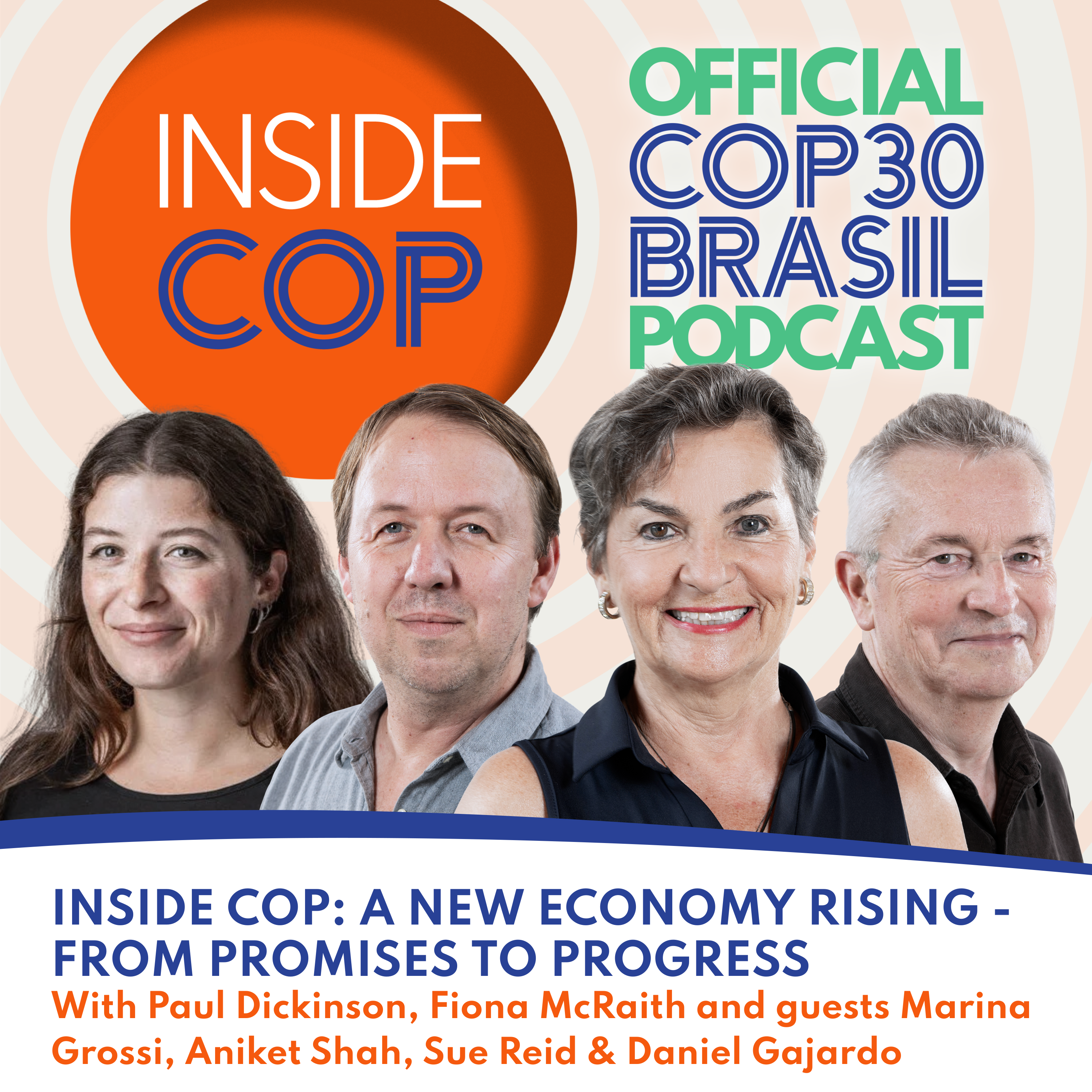
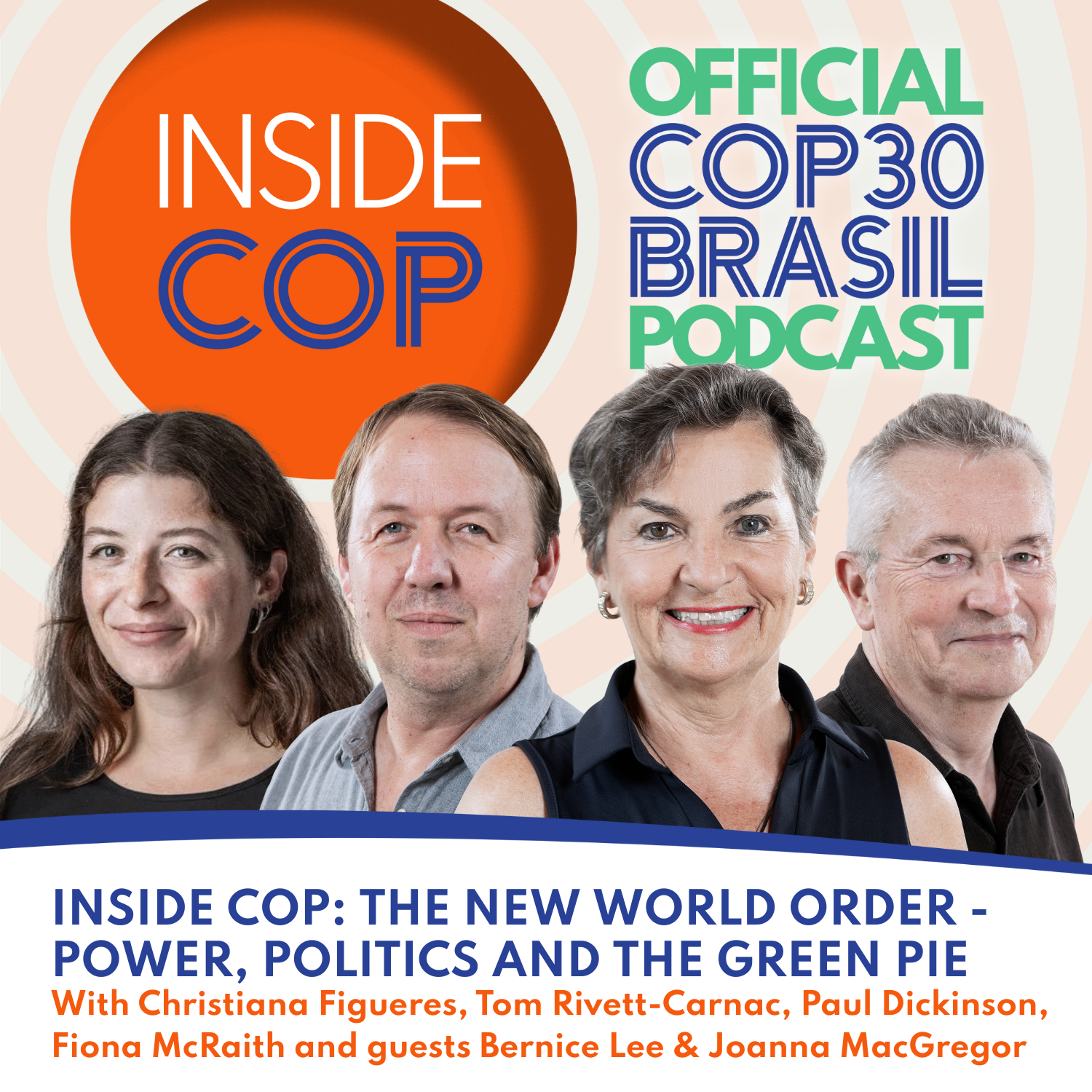
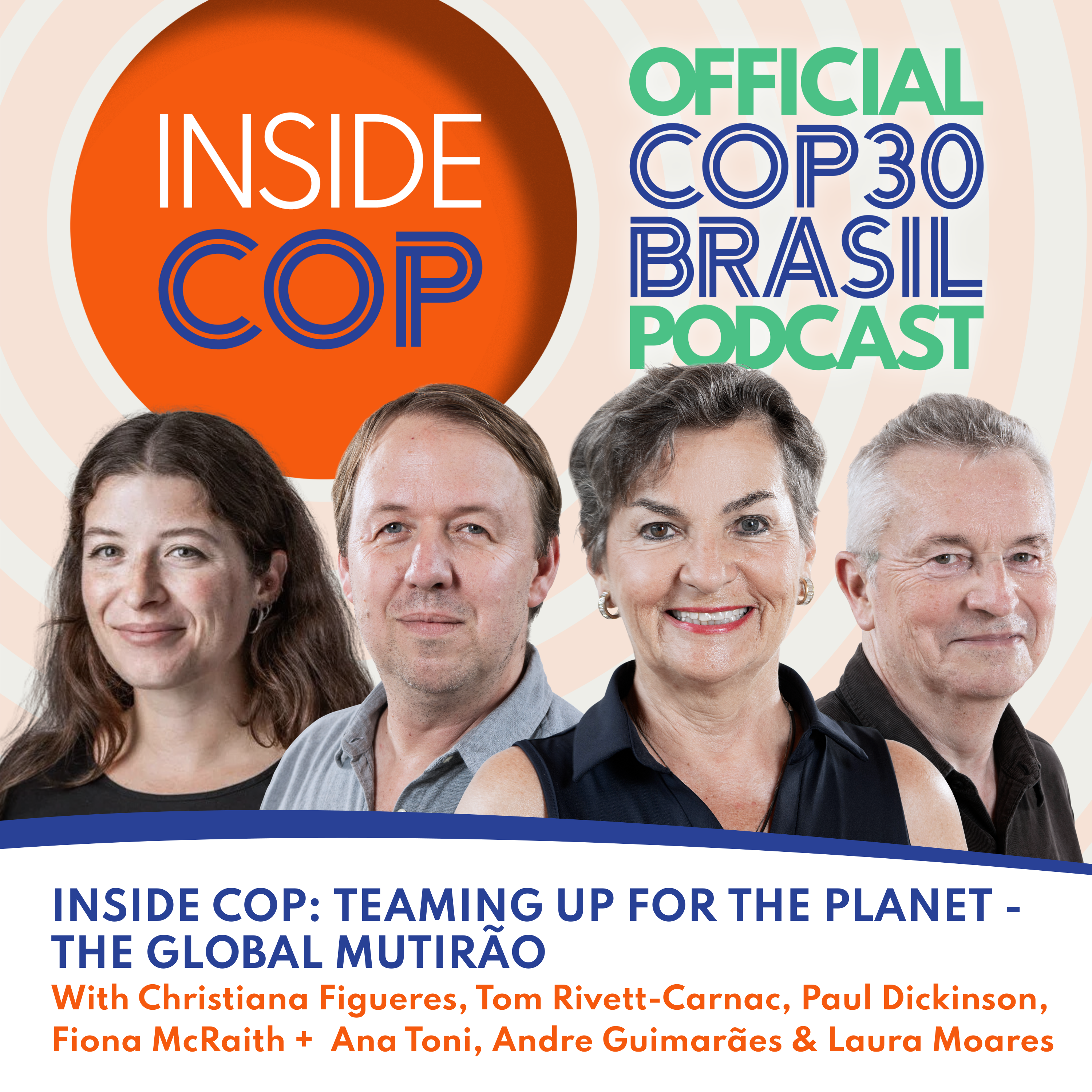
.png)
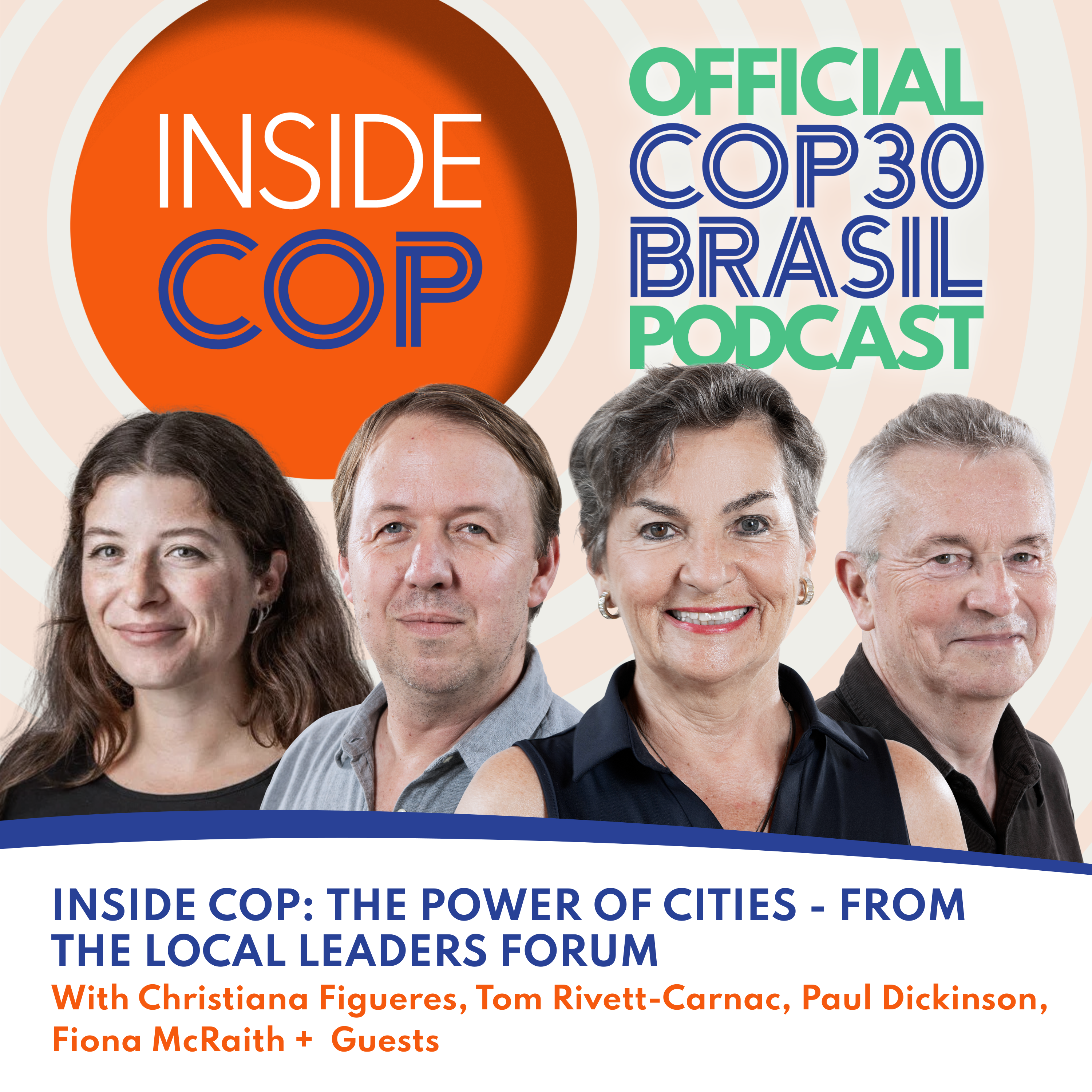

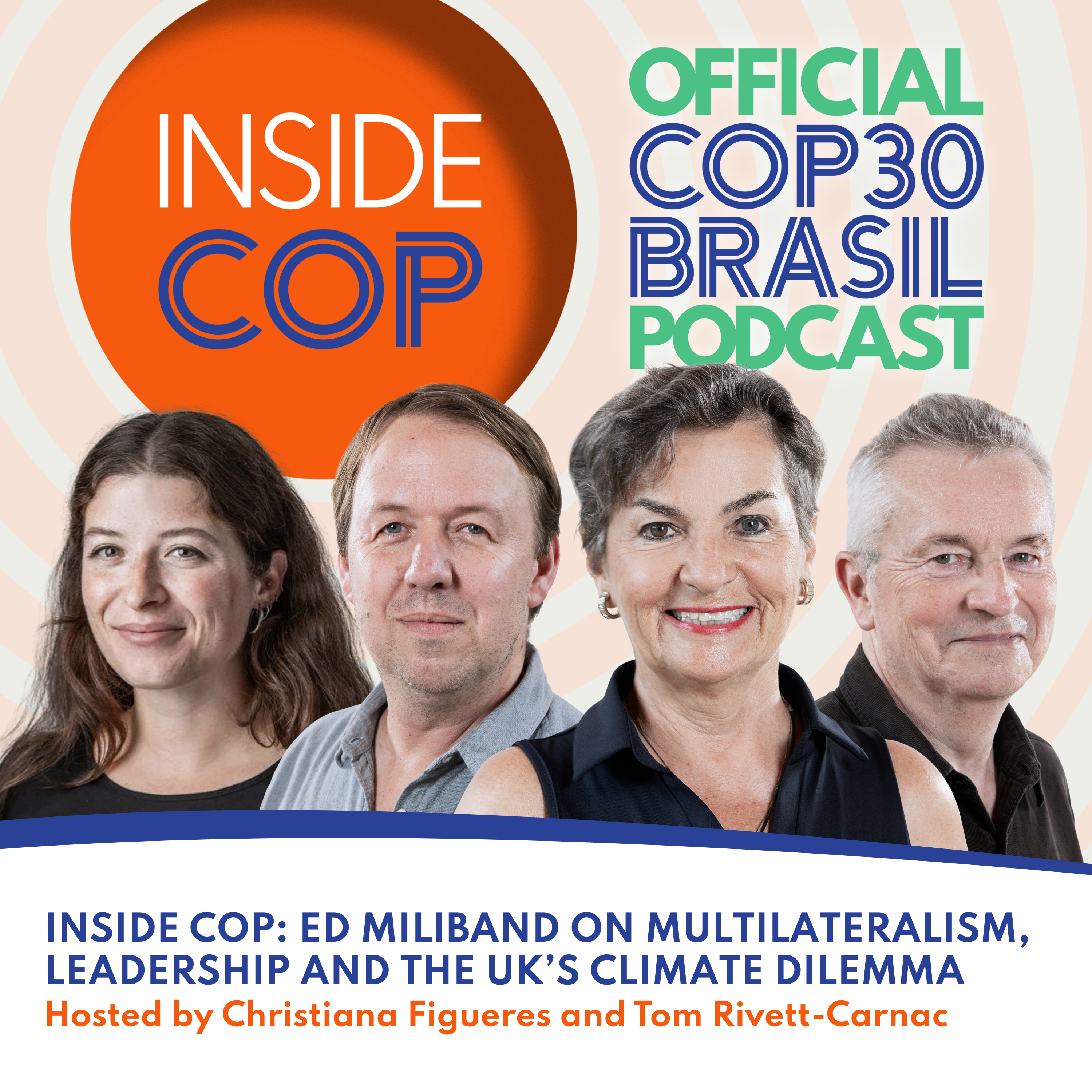
.png)
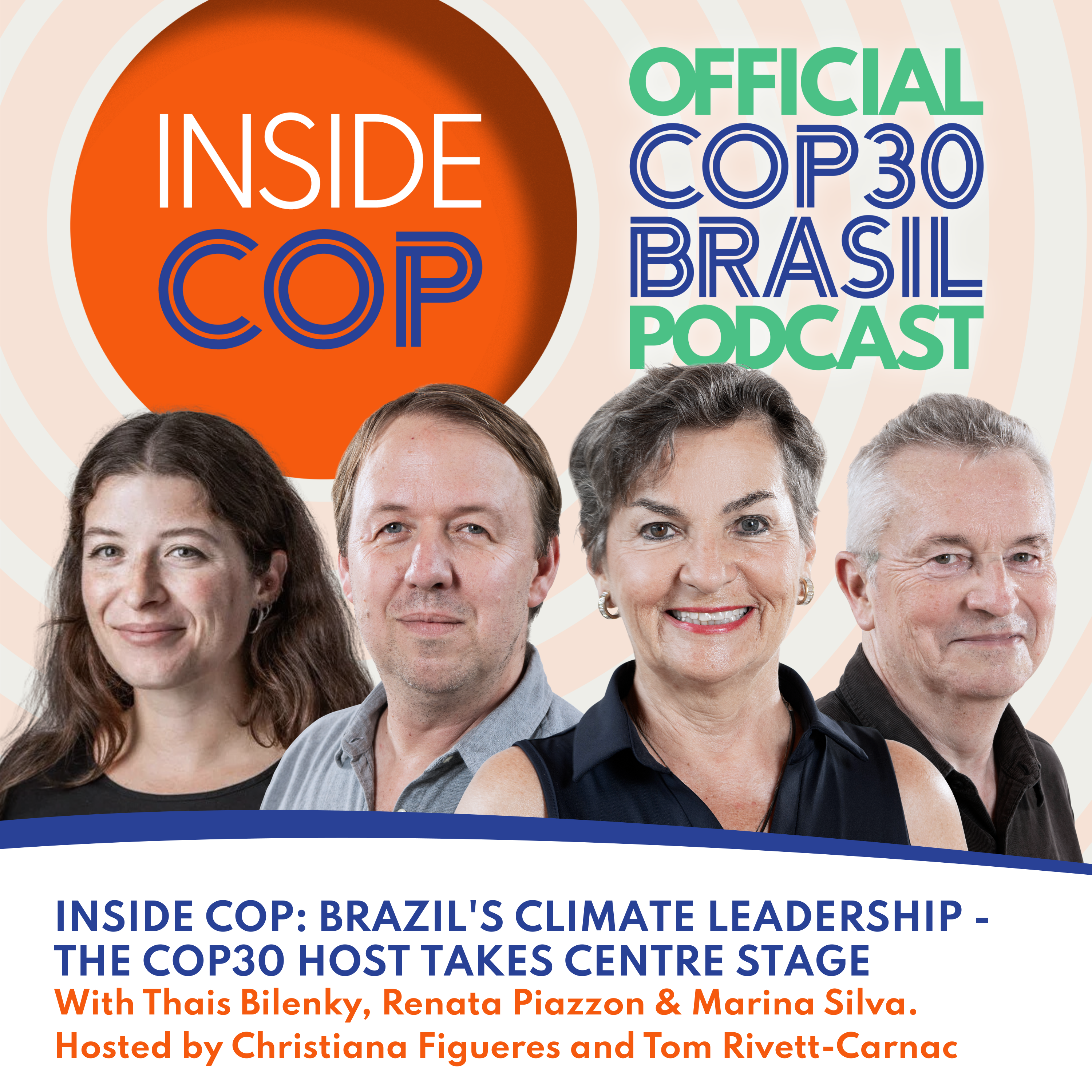
.png)
.png)
.png)
.png)
.png)
.png)
.png)
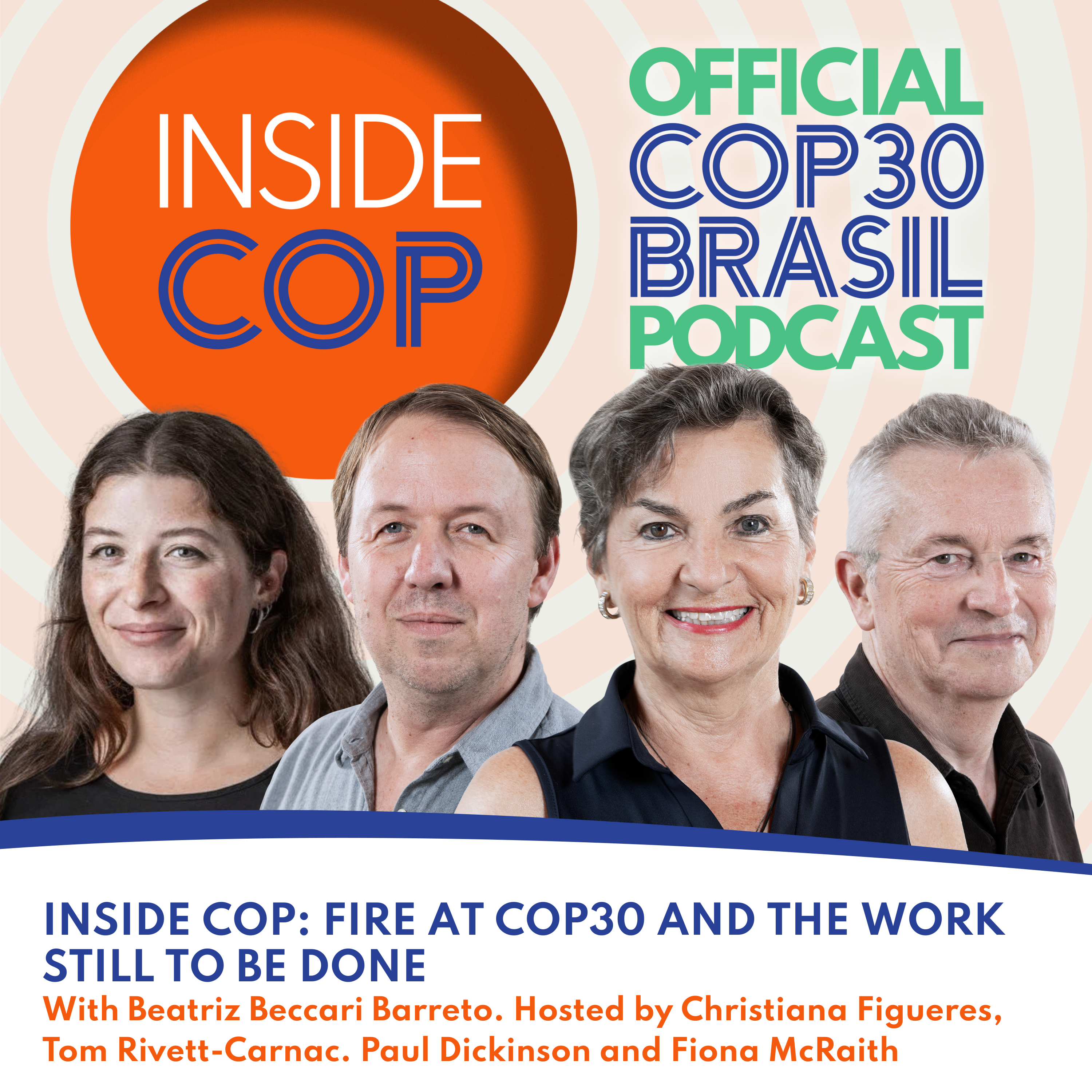

.png)
.png)






